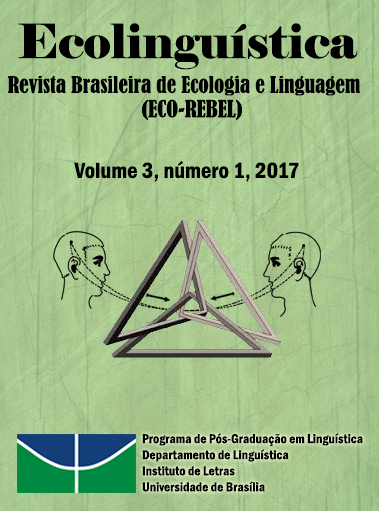Boi Tufão: análise ecolinguística da música sertaneja de raiz na sociedade rural baiana do início do séc. XX
Abstract
The objective of this article is discuss the music and lyrics “Boi Tufão”, sang by Trio Parada Fura, using the framework of ecolinguistics. This piece enables unveils some of the social relationships of the beginning of 20th century in the hinterland of Bahia, as well as the relationships of humans with their environment. The mental make-up of the language is also presente, as can be seen in the lives of the hillbillies. The inevitability of destiny can also be seen in the music, a destiny we cannnot avoid. This happens from the time of the Greeks up to the presente time. There are also some features that do not belong to the hinterland’s lefe.
Downloads
References
COUTO, Elza Kioko Nakayama Nenoki do. Ecolinguistica e Imaginario. Brasília: Thesaurus, 2012.
JUNG, C.G. Tipos psicológicos. Petrópolis: Vozes, 1991.
PEREIRA, Ricardo A. B. Os Sertões ”“ a Narrativa de Euclides da Cunha como referencia principal a tragédia na serie de Canudos. In: Canudos ”“ Tragédia e arte na xilogravura de Adir Botelho. Rio de Janeiro: UFRJ/EBA, 2012.
VERNAT, Jean Pierre. ‘Razões do Mito’. In: Mito e sociedade na Grécia antiga. Brasília: Editora da UnB/Rio de Janeiro: José Olímpio, 1992.
Downloads
Published
How to Cite
Issue
Section
License
Authors who publish in this journal agree to the following terms:
Authors retain copyright and grant the journal the right of first publication. The work is simultaneously licensed under the Creative Commons Attribution License allowing the sharing of the work with acknowledgment of the authorship of the work and initial publication in this journal.
Authors are authorized to enter into additional contracts separately for non-exclusive distribution of the version of the work published in this journal (e.g., publishing in institutional repositories or as book chapters), with acknowledgment of authorship and initial publication in this journal.
Authors are allowed and encouraged to post and distribute their work online (e.g., in institutional repositories or on their personal page) at any point before or during the editorial process, as this can bring about productive revisions as well as increase impact.
Citation of published works (See The Effect of Free Access).



3.png)



